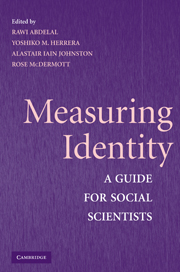Book contents
- Frontmatter
- Contents
- Contributors
- Introduction
- I DEFINITION, CONCEPTUALIZATION, AND MEASUREMENT ALTERNATIVES
- 1 Identity as a Variable
- 2 Conceptualizing and Measuring Ethnic Identity
- 3 Trade-offs in Measuring Identities: A Comparison of Five Approaches
- II SURVEY METHODS
- III CONTENT ANALYSIS AND COGNITIVE MAPPING
- IV DISCOURSE ANALYSIS AND ETHNOGRAPHY
- V EXPERIMENTS
- Bibliography
- Index
2 - Conceptualizing and Measuring Ethnic Identity
Published online by Cambridge University Press: 05 June 2012
- Frontmatter
- Contents
- Contributors
- Introduction
- I DEFINITION, CONCEPTUALIZATION, AND MEASUREMENT ALTERNATIVES
- 1 Identity as a Variable
- 2 Conceptualizing and Measuring Ethnic Identity
- 3 Trade-offs in Measuring Identities: A Comparison of Five Approaches
- II SURVEY METHODS
- III CONTENT ANALYSIS AND COGNITIVE MAPPING
- IV DISCOURSE ANALYSIS AND ETHNOGRAPHY
- V EXPERIMENTS
- Bibliography
- Index
Summary
INTRODUCTION
This chapter considers the conceptualization and measurement of politically relevant group-based social identities such as ethnic identity that have figured prominently in motivating and shaping political action. Although we mention some of the substantive findings that can be established using these measures, our primary concern is with different ways to measure and understand ethnic identity – the use of history, demography, surveys, primary source materials, content analysis, and discourse analysis. We argue that a combination of these methods must be used to fully comprehend the political role of ethnicity at the mass public or elite level.
Ethnicity is an intersubjectively agreed-upon categorization of individuals that is widely and publicly understood to have meaning within a society. Consequently, social scientists often use ethnic categories to interpret and explain facts and events. For example, historians and demographers construct narratives or present data using ethnic categories, and survey researchers ask people about their ethnic identity (e.g., African American, Estonian, Tatar) to determine its prevalence and correlates in a society. Because ethnic identity also motivates human activity and matters for people's lives – especially their political activity – even more can be learned by asking people about these activities (or by observing them directly) as well as by asking them about their identity directly. Moreover, because ethnic identity is constructed through social and psychological processes of categorization (there is no primordial periodic table of social identities), much can be learned about it by studying cultural and social processes, such as the course of political arguments, debates in cultural journals, discussions in the mass media, and social movements that frame, evoke, and memorialize ethnic identities.
- Type
- Chapter
- Information
- Measuring IdentityA Guide for Social Scientists, pp. 33 - 71Publisher: Cambridge University PressPrint publication year: 2009
- 7
- Cited by



